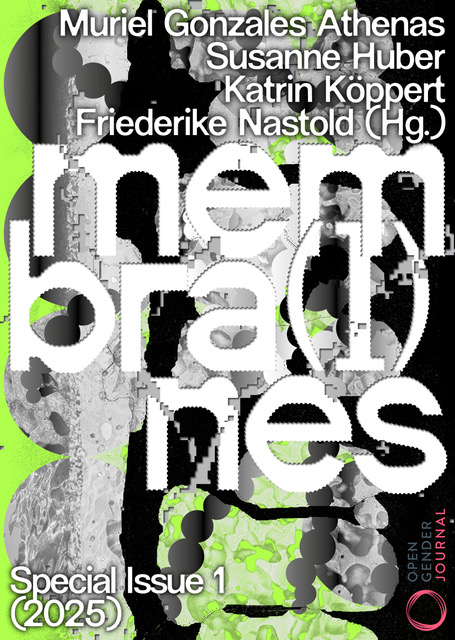Membra(I)nes. Technologies, Theories, and Aesthetics of Im/Permeability. Introduction
DOI:
https://doi.org/10.17169/ogj.2025.400Keywords:
Membrane, Permeability, threshold, decolonializationAbstract
Under the conceptual metaphor “membra(I)nes,” the 12th annual conference of the Gender Studies Association (June 15-17, 2023) focused explicitly for the first time on approaches to intersectional gender research from the perspectives of media, art, and cultural studies. The fact that the conference was held for the first time at art academies and in the eastern German cities of Leipzig and Halle (Saale) continued the programmatic theme of crossing boundaries and permeability at a structural level. In this special issue, the considerations from the event are further pursued, deepened, and expanded beyond the ephemeral format of the conference and made accessible to a broad public.
References
Bahadori, Sara/Nguyen, T./Masal, Rosa/Sanches Martins, Núbia (2022): Complaint as a killjoy-genre. In: Aden, Samia/Tamayo Rojas, Carolina (Hg.): Dekoloniale Interventionen. Münster: Unrast, 15–31.
Bhabha, Homi K. (2011 [2000]): Die Verortung der Kultur. Tübingen: Stauffenburg.

Downloads
Published
How to Cite
Issue
Section
License
Copyright (c) 2025 Muriel González-Athenas, Susanne Huber, Katrin Köppert, Friederike Nastold

This work is licensed under a Creative Commons Attribution 4.0 International License.
All contributions in Open Gender Journal are published under the Creative Commons Attribution 4.0 International license. You may freely make use of the corresponding texts in accordance to the conditions of the license (License contract, generally understandable version). There is no exclusive transfer of usage rights ("copyright transfer"). Open Gender Journal does not charge authors any costs for publication (so-called Article Processing Charges, APC) or submission (so-called Submission Charges). Authors are encouraged to share their contributions in other places, such as repositories.












